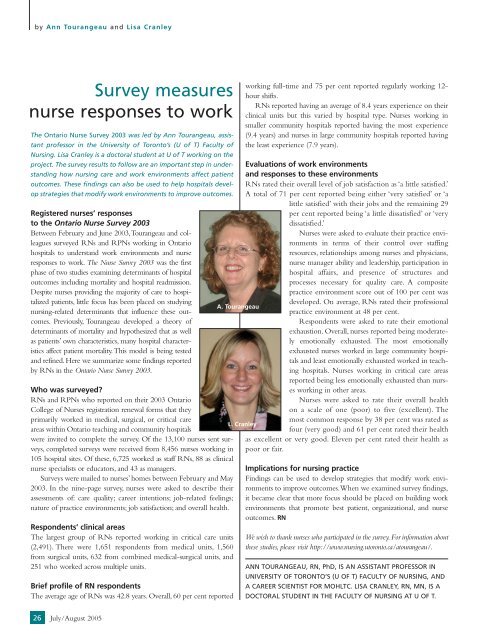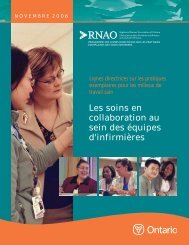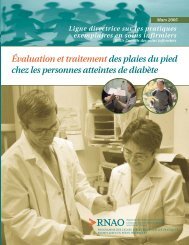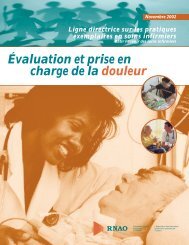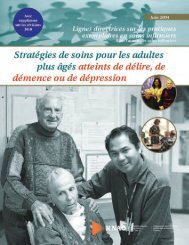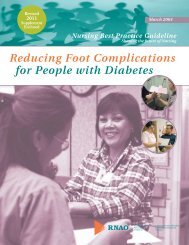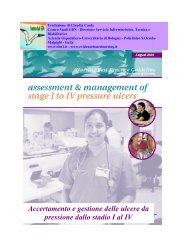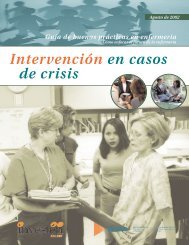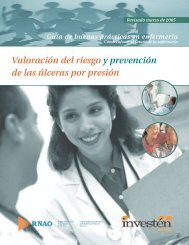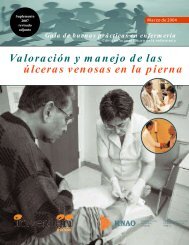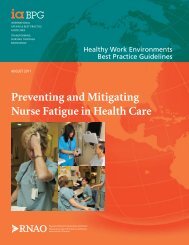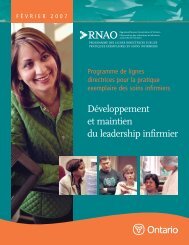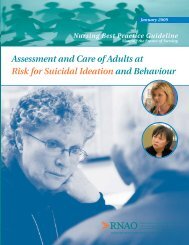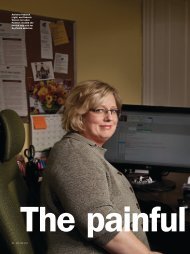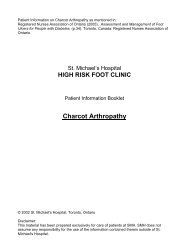lhins: bringing it all back home - Registered Nurses' Association of ...
lhins: bringing it all back home - Registered Nurses' Association of ...
lhins: bringing it all back home - Registered Nurses' Association of ...
You also want an ePaper? Increase the reach of your titles
YUMPU automatically turns print PDFs into web optimized ePapers that Google loves.
y Ann Tourangeau and Lisa Cranley<br />
Survey measures<br />
nurse responses to work<br />
The Ontario Nurse Survey 2003 was led by Ann Tourangeau, assistant<br />
pr<strong>of</strong>essor in the Univers<strong>it</strong>y <strong>of</strong> Toronto’s (U <strong>of</strong> T) Faculty <strong>of</strong><br />
Nursing. Lisa Cranley is a doctoral student at U <strong>of</strong> T working on the<br />
project. The survey results to follow are an important step in understanding<br />
how nursing care and work environments affect patient<br />
outcomes. These findings can also be used to help hosp<strong>it</strong>als develop<br />
strategies that modify work environments to improve outcomes.<br />
<strong>Registered</strong> nurses’ responses<br />
to the Ontario Nurse Survey 2003<br />
Between February and June 2003,Tourangeau and colleagues<br />
surveyed RNs and RPNs working in Ontario<br />
hosp<strong>it</strong>als to understand work environments and nurse<br />
responses to work. The Nurse Survey 2003 was the first<br />
phase <strong>of</strong> two studies examining determinants <strong>of</strong> hosp<strong>it</strong>al<br />
outcomes including mortal<strong>it</strong>y and hosp<strong>it</strong>al readmission.<br />
Desp<strong>it</strong>e nurses providing the major<strong>it</strong>y <strong>of</strong> care to hosp<strong>it</strong>alized<br />
patients, l<strong>it</strong>tle focus has been placed on studying<br />
nursing-related determinants that influence these outcomes.<br />
Previously, Tourangeau developed a theory <strong>of</strong><br />
determinants <strong>of</strong> mortal<strong>it</strong>y and hypothesized that as well<br />
as patients’ own characteristics, many hosp<strong>it</strong>al characteristics<br />
affect patient mortal<strong>it</strong>y.This model is being tested<br />
and refined. Here we summarize some findings reported<br />
by RNs in the Ontario Nurse Survey 2003.<br />
Who was surveyed?<br />
RNs and RPNs who reported on their 2003 Ontario<br />
College <strong>of</strong> Nurses registration renewal forms that they<br />
primarily worked in medical, surgical, or cr<strong>it</strong>ical care<br />
areas w<strong>it</strong>hin Ontario teaching and commun<strong>it</strong>y hosp<strong>it</strong>als<br />
were inv<strong>it</strong>ed to complete the survey. Of the 13,100 nurses sent surveys,<br />
completed surveys were received from 8,456 nurses working in<br />
105 hosp<strong>it</strong>al s<strong>it</strong>es. Of these, 6,725 worked as staff RNs, 88 as clinical<br />
nurse specialists or educators, and 43 as managers.<br />
Surveys were mailed to nurses’<strong>home</strong>s between February and May<br />
2003. In the nine-page survey, nurses were asked to describe their<br />
assessments <strong>of</strong>: care qual<strong>it</strong>y; career intentions; job-related feelings;<br />
nature <strong>of</strong> practice environments; job satisfaction; and over<strong>all</strong> health.<br />
Respondents’ clinical areas<br />
The largest group <strong>of</strong> RNs reported working in cr<strong>it</strong>ical care un<strong>it</strong>s<br />
(2,491). There were 1,651 respondents from medical un<strong>it</strong>s, 1,560<br />
from surgical un<strong>it</strong>s, 632 from combined medical-surgical un<strong>it</strong>s, and<br />
251 who worked across multiple un<strong>it</strong>s.<br />
Brief pr<strong>of</strong>ile <strong>of</strong> RN respondents<br />
The average age <strong>of</strong> RNs was 42.8 years. Over<strong>all</strong>, 60 per cent reported<br />
26 July/August 2005<br />
A. Tourangeau<br />
working full-time and 75 per cent reported regularly working 12hour<br />
shifts.<br />
RNs reported having an average <strong>of</strong> 8.4 years experience on their<br />
clinical un<strong>it</strong>s but this varied by hosp<strong>it</strong>al type. Nurses working in<br />
sm<strong>all</strong>er commun<strong>it</strong>y hosp<strong>it</strong>als reported having the most experience<br />
(9.4 years) and nurses in large commun<strong>it</strong>y hosp<strong>it</strong>als reported having<br />
the least experience (7.9 years).<br />
Evaluations <strong>of</strong> work environments<br />
and responses to these environments<br />
RNs rated their over<strong>all</strong> level <strong>of</strong> job satisfaction as ‘a l<strong>it</strong>tle satisfied.’<br />
A total <strong>of</strong> 71 per cent reported being e<strong>it</strong>her ‘very satisfied’ or ‘a<br />
l<strong>it</strong>tle satisfied’ w<strong>it</strong>h their jobs and the remaining 29<br />
per cent reported being ‘a l<strong>it</strong>tle dissatisfied’ or ‘very<br />
dissatisfied.’<br />
Nurses were asked to evaluate their practice environments<br />
in terms <strong>of</strong> their control over staffing<br />
resources, relationships among nurses and physicians,<br />
nurse manager abil<strong>it</strong>y and leadership, participation in<br />
hosp<strong>it</strong>al affairs, and presence <strong>of</strong> structures and<br />
processes necessary for qual<strong>it</strong>y care. A compos<strong>it</strong>e<br />
practice environment score out <strong>of</strong> 100 per cent was<br />
developed. On average, RNs rated their pr<strong>of</strong>essional<br />
practice environment at 48 per cent.<br />
Respondents were asked to rate their emotional<br />
exhaustion. Over<strong>all</strong>, nurses reported being moderately<br />
emotion<strong>all</strong>y exhausted. The most emotion<strong>all</strong>y<br />
exhausted nurses worked in large commun<strong>it</strong>y hosp<strong>it</strong>als<br />
and least emotion<strong>all</strong>y exhausted worked in teaching<br />
hosp<strong>it</strong>als. Nurses working in cr<strong>it</strong>ical care areas<br />
reported being less emotion<strong>all</strong>y exhausted than nurses<br />
working in other areas.<br />
Nurses were asked to rate their over<strong>all</strong> health<br />
on a scale <strong>of</strong> one (poor) to five (excellent). The<br />
most common response by 38 per cent was rated as<br />
four (very good) and 61 per cent rated their health<br />
as excellent or very good. Eleven per cent rated their health as<br />
poor or fair.<br />
L. Cranley<br />
Implications for nursing practice<br />
Findings can be used to develop strategies that modify work environments<br />
to improve outcomes.When we examined survey findings,<br />
<strong>it</strong> became clear that more focus should be placed on building work<br />
environments that promote best patient, organizational, and nurse<br />
outcomes. RN<br />
We wish to thank nurses who participated in the survey.For information about<br />
these studies, please vis<strong>it</strong> http://www.nursing.utoronto.ca/atourangeau/.<br />
ANN TOURANGEAU, RN, PhD, IS AN ASSISTANT PROFESSOR IN<br />
UNIVERSITY OF TORONTO’S (U OF T) FACULTY OF NURSING, AND<br />
A CAREER SCIENTIST FOR MOHLTC. LISA CRANLEY, RN, MN, IS A<br />
DOCTORAL STUDENT IN THE FACULTY OF NURSING AT U OF T.


